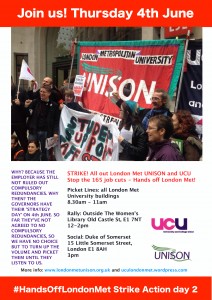DEFEND JOBS – DEFEND EDUCATION
Category Archives: News & Comment
UNISON TO CONSULT MEMBERS ON LATEST PAY OFFER
Consultation will take place between 20 May and 26 June on the offer of 1% pay rise, with more for lower paid, across the UK Continue reading
HIGHER EDUCATION UNIONS SUBMIT 2015-16 PAY CLAIM
Joint higher education unions’ pay claim for 2015-16 covers pay and pay-related equality matters
HAVING A UNION REP CAN BOOST JOB QUALITY
‘Collective voice’ linked to improved employee well-being
Having a union representative in the workplace can reduce employees’ stress levels, improve their work-life balance, and increase their well-being overall, according to academic research.
The paper, Union representation, collective voice and job quality: an analysis of a survey of union members in the UK finance sector, showed that respondents’ perceptions of job quality were more favourable in organisations where an onsite representative was present.
WOMEN’S CONFERENCE REPORT
12-14 February 2015 Southport Theatre and Convention Centre
UNISON National Women’s Conference Report by Tracey Holland Branch Treasurer
NO VOTE, NO VOICE
OVERTIME AND HOLIDAY PAY
In early November, an Employment Appeal Tribunal decision in three linked cases hit the headlines. The central issue was whether holiday pay should be calculated to reflect regular but non-contractual overtime pay.
Traditionally, the pay workers receive while on holiday has often been calculated on the basis of a week’s “basic salary”, which would exclude things like allowances, expenses, commission payments and overtime. A 2004 case established that overtime should only be included if the employer was contractually required to provide overtime (which is rare, more usually workers are required to work overtime but employers are not required to provide it). A succession of recent cases has started to change this. In one, Lock v British Gas Trading Ltd (involving a UNISON member), the European Court of Justice eventually ruled that holiday pay should include commission payments, if these were part of normal pay. A significant drop in earnings was assessed to be a deterrent to workers taking their annual leave, thereby breaching the Working Time Directive.
In the latest test cases (Fulton v Bear (Scotland), Hertel (UK Ltd) v Wood and Others, and Amec Group Ltd v Law and Others), the judge reversed the 2004 decision, concluding that where employees were required to work overtime when it was offered, even if employers were not required to offer it, overtime pay and other allowances which constitute “normal pay” should be included in holiday pay calculations. Holiday pay should include all regular work payments, so that workers do not suffer financially when taking annual leave.
This ruling would seem to enable claims to be brought in respect of underpaid holiday pay, where it has been incorrectly calculated in the light of the above ruling.
However, the advice we have received from UNISON Yorkshire & Humberside Regional HQ suggests that caution is required.
First of all, the ruling could still be appealed – final resolution may take a long time yet.
Secondly, the ruling can be interpreted in different ways.
Thirdly, it is not clear that we have anyone at Sheffield Hallam who this ruling would apply to, regardless of interpretation.
Fourthly, the ruling also states that the new entitlement would only apply to the basic four weeks’ statutory holiday entitlement under the Working Time Directive, not all annual leave entitlement (i.e. not including contractual leave and the additional 1.6 weeks leave provided for in UK law) . This minimum statutory leave, it seems, was determined by the judge to constitute the first 20 days of annual leave taken in any leave year.
Fifthly, for a claim to be valid it must be made within three months of an underpayment for holiday.
And sixthly, where there has been a series of underpayments, a claim could theoretically be made to recover back pay for the historic series of underpayments. However, only those underpayments made within three months of each other count as part of a series for which back pay could be claimed. In other words, if there has been more than a three month gap between underpayments for annual leave, the series is broken and the amount of back pay that could be claimed is limited to the most recent period of leave for which there was an underpayment. This is a significant limitation, given holiday patterns and given that only the first 20 days of annual leave in a leave year counts anyway.
In conclusion, this judgement is interesting but complex, and any member who believes that they have been underpaid for holiday in the light of this judgement should contact Dan Bye, Branch Secretary, as soon as possible.
CARE UK STRIKERS CELEBRATE VICTORY
The longest running social care strike in the history of the NHS has formally ended after 90 days.
UNISON members employed by Care UK in Doncaster have voted to accept the concessions won from the employer read more
TUC MARCH AND RALLY
Gallery

This gallery contains 3 photos.
Thousands took part in the TUC march and rally in London on 18 October. Here are some of the photographs taken by members from our branch. Guardian pictures
POLITICAL FUND BALLOT – VOTE YES
Vote for UNISON’s political voice….read more




